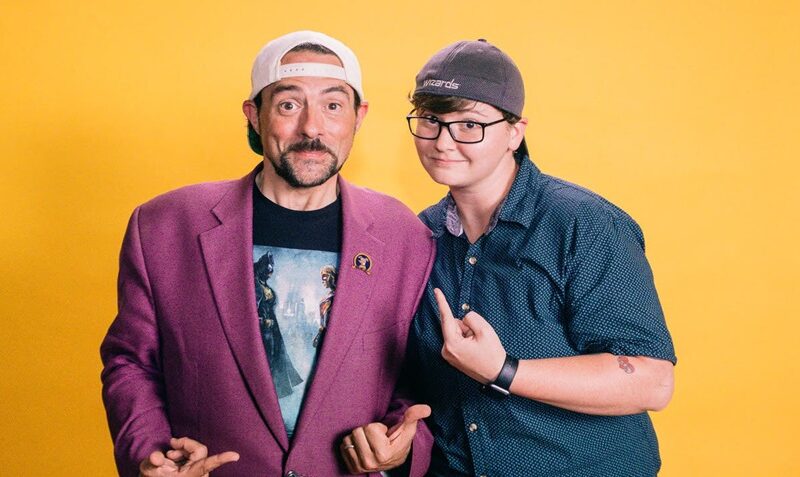Chasing Chasing Amy (Rodgers, 2024)
Earlier this year, I wrote on social media about a documentary chronicling the life of a gay subject, and my review almost immediately received a comment (since deleted) expressing surprise that I would dare to address the film while simultaneously revealing on my profile that I was “married” (and, hence, presumably hetero) and Christian.
I never did find out if the underlying assumption was that I would be crucified by gay readers for venturing onto their turf or by Christian readers for being interested in a topic they weren’t. Oh well, trolls happen. I almost immediately forgot about the exchange until I received promotion material for Chasing Chasing Amy, a documentary purporting to examine why Kevin Smith’s indie classic was “polarizing” in the LGBTQ+ community.
Yes, please. What better way for the straight male critic to demonstrate some interest in the community than to watch a movie about the community talking to itself.
As it turns out, though, the film is less interested in interrogating Smith or Chasing Amy than it is in documenting director Sav Rodgers’ far less conflicted admiration for the film and its maker. The film begins with Rodgers’ own TED talk, pointedly called “The Romcom that Saved My Life.” Okay, I thought, perhaps this is an awkward introduction to the subject before settling down to actually documenting the arguments about the film. Instead, it turns out that the film is at least half — I would argue more than half — about the role the film played in his own sexual identity development. I would hope it goes without saying, though it probably doesn’t, that any decent human being of any sexual orientation ought be glad for Rodgers that he found a way forward toward authenticity while surviving a culture (Kansas in the nineties) that wasn’t tolerant of who or what he was). But that’s a far less interesting topic for a movie than would be a critical examination of the movie that holds such personal meaning for him.
The intensity of Rodgers’ affinity for Chasing Amy, while understandable, in some ways makes him the least effective person to hear or respond to criticisms of it. While nowhere near as disingenuous, the film reminded me of Christian films like Do You Believe? or God’s (Not) Dead, where the filmmakers genuinely appear to believe they are depicting contrarian points of view accurately or respectfully, blissfully unaware of the remotest possibility of bias in their own observations or reporting. Sure, Rodgers asks Smith if he can understand why some LGBTQ+ viewers don’t like Chasing Amy, but doesn’t that simply allow Smith, a participant, to frame the conflict rather than respond to it?
The film’s structure muddies a central question — is this a film about Chasing Amy or about Rodgers? Actually, that question isn’t particularly muddy. The answer is that it is about Rodgers. The muddy question is whether or not Rodgers is aware of this. In one exchange with Smith, Rodgers apparently expresses some reservation about inserting himself into the film only to have Smith reply, twice, that doing so is “smart,” yet another example of the fan letting his subject call the shots.
For about half the film, I wondered if the B-side story was meant to parallel what Smith was saying about Chasing Amy itself — that it was a film drawn from his personal experience. Is Rodgers’ trying to imitate his hero by emulating his creative process? I don’t think so, but I could be wrong. The duller but more probable answer is that maybe the director is technically as well as emotionally stretching here. I have long railed against the critical tendency to think of documentaries as not being directed because we equate direction much more with cinematography than editing. But the way footage is put together tells the story in a very specific way. I actually think it is harder to sift footage and organize it coherently than to shoot to a script. Hence, the job of the director in a documentary can be more challenging.
The story that Rodgers puts together is about the power of art to give hope, about the importance of representation, and about how art comes to have personal meaning that transcends its author’s intentions or the critical consensus surrounding it. Those are fascinating, meaningful topics, and I certainly would have been interested in a documentary that consciously focused on those things, rather than on one where those things kept emerging and interrupting what was supposed to be a broader examination of LGBTQ+ representation as mediated by a particular case study. It was as if My Date with Drew had been marketed as a documentary about the cultural impact of E.T.
It’s not a total loss, though. The second half of the film does gesture at examining the film, and Rodgers has enough instinctive integrity that contrarian perspectives don’t get silenced or smothered. So there is a worthy documentary in here somewhere, but it never quite takes shape.

